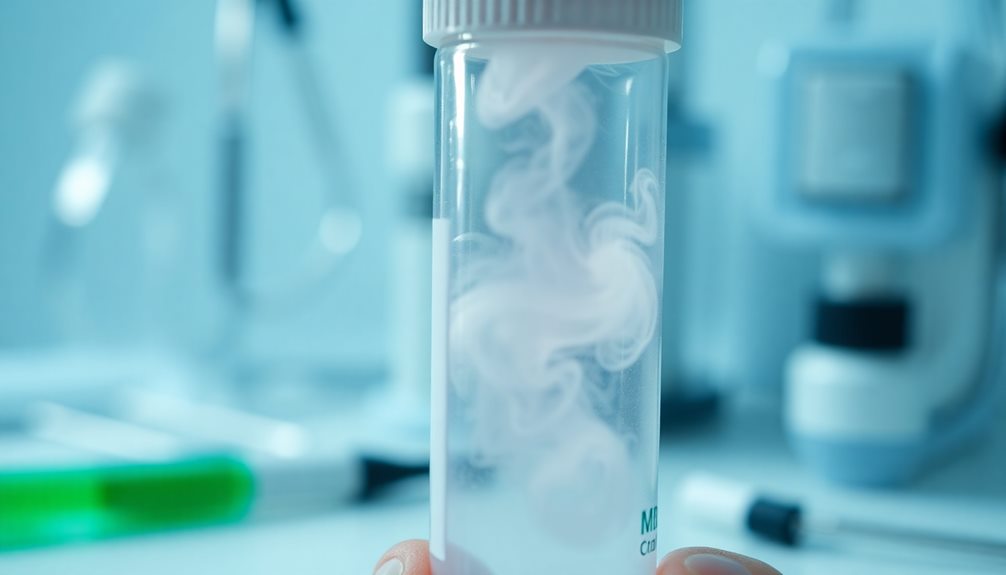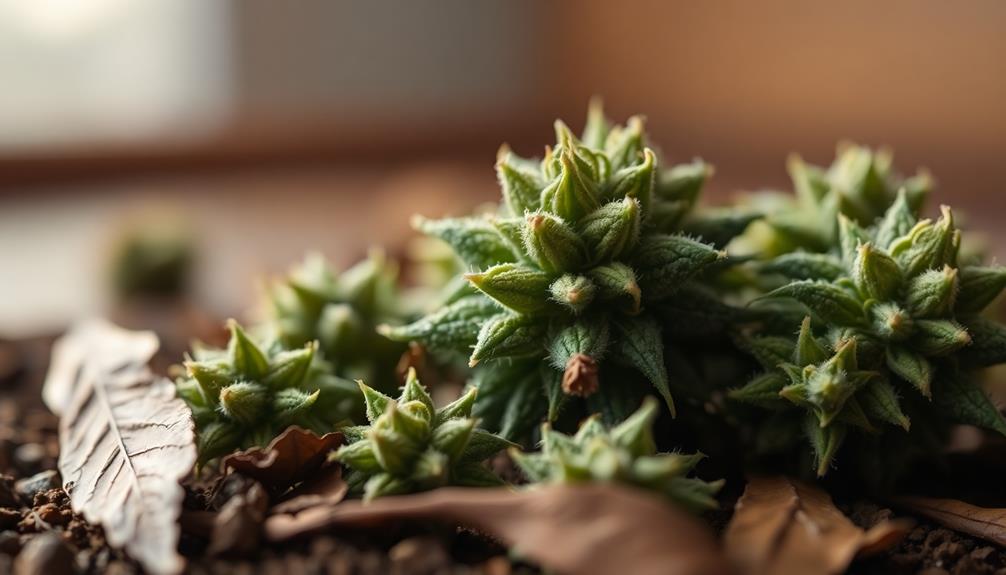If you're noticing an unusual smell from discharge, it's important to pay attention. STD-related discharge often has a strong, fishy odor, particularly with bacterial infections. You might also smell a musty or sour scent, signaling other potential issues. Some infections, like yeast infections, can give off a sweet or bread-like aroma. Remember, the smell can change with your menstrual cycle or even what you eat. Any sudden changes should prompt you to consult a healthcare provider. Staying alert to these signs helps ensure your health and wellbeing, and there's plenty more to discover about this topic!
Key Takeaways
- Strong, fishy odors often indicate bacterial infections, including bacterial vaginosis, which can coexist with STIs.
- Greenish discharge may suggest gonorrhea or chlamydia, often accompanied by a foul smell.
- Yeast infections typically produce a sweet or bread-like smell, differing from bacterial infections.
- Sudden changes in discharge smell or consistency should prompt consultation with a healthcare provider for potential STIs.
- Maintaining awareness of discharge changes can empower proactive health management and prompt timely medical advice.
Introduction

When it comes to understanding sexually transmitted diseases (STDs), one important aspect to consider is the nature of the discharge that may accompany them. You might notice different types of discharge, and recognizing these differences can help you understand what's happening in your body.
It's essential to pay attention to changes, as they can signal an issue that needs attention. Discharge can vary in color, consistency, and amount, and these variations can provide clues about your health.
For instance, a thick, white discharge might suggest a yeast infection, while a greenish discharge could indicate something more serious, like gonorrhea or chlamydia. Being aware of these signs helps you stay informed and proactive about your health.
If you're ever unsure, consulting a healthcare provider is a smart move. They can give you the right guidance and support.
Description of the Smell

Several factors can influence the smell of discharge associated with STDs, and understanding these can provide important insights into your health. When you experience discharge, you might notice it has a strong, fishy odor, especially with bacterial infections. This smell can be quite unpleasant and may catch you off guard.
On the other hand, yeast infections often lead to a discharge that smells sweet or bread-like, which can be surprising. If your discharge has a musty or sour scent, it could indicate another type of infection.
It's important to remember that the smell might change throughout your menstrual cycle or due to other factors like diet and hygiene. If you notice a sudden or unusual change in the smell of your discharge, it's a good idea to pay attention. Your body is sending you signals!
While discussing these smells might feel awkward, recognizing them can help you take charge of your health. Don't hesitate to consult a healthcare professional if you have concerns. They can help you understand what's happening and provide support.
Keeping an eye on these changes is a smart step toward your well-being!
Source and Composition

The source and composition of discharge can provide valuable information about your reproductive health. When you notice changes in your discharge, it's important to pay attention.
Discharge mainly comes from your cervix and vaginal walls, where glands produce a mix of fluids. This mix typically includes mucus, bacteria, and cells that help keep your vagina healthy.
The composition can vary depending on your menstrual cycle, hormonal changes, and even your overall health. For example, during ovulation, you might notice clear, stretchy discharge, while right before your period, it may become thicker and cloudier.
If you have an infection, the discharge might change in color or smell, indicating that something's not quite right. Understanding these changes can help you monitor your body's signals.
If you notice yellow, green, or foul-smelling discharge, it's a good idea to consult a healthcare provider. They can guide you through any concerns you might have.
Typical Scenarios or Environments

Many women encounter various scenarios or environments that can influence the smell of their discharge. For instance, when you're on your period, hormonal changes can lead to a stronger scent.
If you've been exercising, sweat and moisture can also change how your discharge smells. Think about the gym; the combination of sweat and discharge can create a unique odor that might surprise you.
Another scenario is when you're using certain soaps or laundry detergents. Harsh chemicals can disrupt your natural balance, leading to a different smell.
If you've recently traveled, humidity or different water sources can also impact how your discharge smells.
Diet plays a role too! Consuming garlic, onions, or spicy foods might alter your body odor, including discharge. It's fascinating how what you eat affects your natural scent.
Lastly, if you've been under stress, your body reacts in various ways, potentially affecting your discharge's smell.
Emotional or Cultural Associations

Cultural beliefs and emotional responses can significantly shape how women perceive the smell of their discharge. For many, the scent might bring up feelings of embarrassment or anxiety, especially if they associate it with potential health issues.
You might find that your background influences how you view these natural bodily functions. In some cultures, there's a stigma attached to discussing anything related to women's health, leading to feelings of shame.
On the other hand, some cultures encourage open conversations about women's bodies, which can make you feel more comfortable. When you're supported by your community, you're more likely to view any unusual smell as a normal part of life.
It's essential to remember that every woman's experience is unique. You might feel empowered to learn more about your body, and that curiosity can shift your emotional response. Instead of letting fear dictate your feelings, consider embracing knowledge.
Understanding your body's signals can turn anxiety into confidence, helping you feel more in control. Ultimately, how you perceive the smell of your discharge can be influenced by your emotions and the cultural context you live in, shaping your overall experience.
Health or Safety Considerations

Understanding the health implications behind unusual discharge smells is crucial for maintaining your well-being. When you notice a strong or distinct odor, it can signal that something isn't quite right in your body. Your body often communicates through these smells, so paying attention is important.
If your discharge smells fishy or sour, it could indicate an infection, such as bacterial vaginosis or a sexually transmitted infection (STI). These conditions can lead to more serious health issues if left untreated. You might also notice changes in color or consistency, which can add to the clues your body is giving you.
It's always a good idea to consult a healthcare professional if you notice these changes. They can help you understand what's happening and suggest treatment options. Remember, there's no need to feel embarrassed; many people experience similar issues.
Taking action not only helps you feel better but also protects your overall health. You deserve to feel your best, so don't hesitate to reach out for advice. By being proactive about your health, you're taking a big step towards ensuring your well-being.
Final Thoughts

Recognizing the signs your body sends through unusual discharge smells can be a game-changer for your health. When you notice something off, like a strong or fishy odor, it's important to pay attention. These smells can indicate infections or sexually transmitted diseases (STDs) that need medical help. Don't ignore them!
Understanding your body helps you take control of your health. If you're experiencing strange discharge, seeing a doctor is a smart choice. They can provide the right tests and treatments, making sure you stay healthy and happy. You're not alone in this; many people face similar situations.
Taking action can reduce anxiety and improve your well-being. Think of it as a way to empower yourself. You deserve to feel good in your body!
Also, remember that practicing safe sex and maintaining good hygiene can help prevent many issues from arising in the first place.
Frequently Asked Questions
Can STD Discharge Smell Vary Between Individuals?
Yes, STD discharge smell can vary between individuals. Factors like personal hygiene, diet, and the specific infection can influence the odor. It's essential to pay attention to any unusual changes and consult a healthcare professional.
Is a Strong Smell Always a Sign of an STD?
A strong smell isn't always a sign of an STD. It could result from infections, hygiene issues, or other factors. If you're concerned, consulting a healthcare professional for evaluation and guidance is essential.
How Can I Differentiate Between STD Discharge and Normal Discharge?
To differentiate between STD discharge and normal discharge, observe color, consistency, and smell. Normal discharge is usually clear or white, while abnormal may be yellow, green, or have a strong odor. Trust your instincts and seek medical advice if unsure.
Should I See a Doctor if I Notice an Unusual Smell?
If you notice an unusual smell, you should definitely see a doctor. It's important to address any changes in your body, as they could indicate an infection or other health issue that needs attention.
Can Medications Affect the Smell of STD Discharge?
Yes, medications can affect the smell of discharge. Antibiotics or antifungals might alter the balance of bacteria and yeast in your body, which can change how your discharge smells. Always consult your doctor for concerns.









